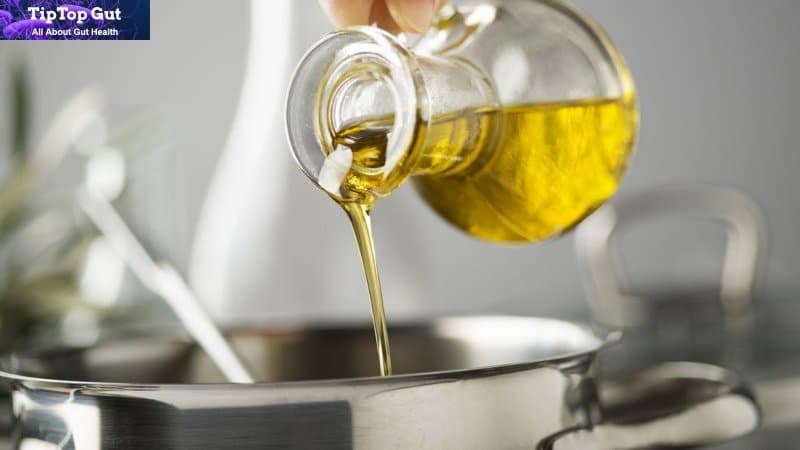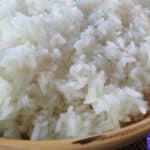Your meals mostly maintain a healthy and balanced gut microbiota. However, how you prepare and cook these foods might be just as crucial to the health of your digestive system.
Your choice of oil is important whether you are grilling, baking, sautéing, or frying. In the human diet, fats and oils are essential, yet not all oils are created equal. There are “good” and “bad” fats in your health.
Once you know this, you can search your cabinet and replace your unhealthy cooking oils with healthier ones.
Oils for frying are a necessary ingredient in any kitchen. However, there is a lot of contradictory data regarding how healthy each is. How can we choose which to use and if we should be avoiding any entirely with so many options available on the market, from coconut to olive, vegetable to canola, avocado to rapeseed oil?
The nut, seed, fruit, plant, or cereal extracted from—either through crushing, pressing, or processing—usually gives rise to the name of the oil used for cooking. They stand out for high-fat content, including saturated, monounsaturated, and polyunsaturated fatty acids.
So, what is the best cooking oil for gut health? Let’s explore the answer.
Good Cooking Oils and Why They Matter?
The smoke point is eventually reached when cooking oils are heated, especially at high heat. When the oil reaches this temperature, it loses its stability and starts to degrade.
Free radicals are produced when oil oxidizes and starts to break down. These substances may cause cellular damage that could result in disease development, which could have harmful effects on health.
Additionally, a chemical called acrolein is released when oils burn off, which can give food a burnt taste. Additionally, acrolein in the air may be harmful to your lungs.
A cooking oil’s quality might be impacted by how much processing it has; therefore, it’s also crucial to consider this.
Oils that have undergone minimum processing may contain sediment particles have a cloudier look, and retain more natural flavor and color than oils that have undergone high levels of processing, which are more expensive and have a uniform appearance.
Compared to highly processed cooking oils, unrefined oils may be higher in nutrients but are also more heat-sensitive and more likely to go rancid. Unrefined oils typically have lower smoke points compared to refined oils.
Some refined oils are obtained through the pressing of seeds or plants, while others are obtained through the use of chemical solvents. Oils prepared through pressing, like cold-pressed olive oil, are preferred by many health-conscious consumers over chemically extracted ones.
Remember that the amount and types of fatty acids in oils from various sources might fluctuate greatly depending on the source. This may have a considerable impact on their health impacts.
It’s essential to understand the distinction between good and harmful fat to choose the finest cooking oil for intestinal health. Check it out.
Read More:
Biotics 8 Review: SCAM or A Legit Probiotic for Men?
What Makes Good Fat Different from Bad Fat?
Monounsaturated and polyunsaturated fats are considered healthy fats; however, saturated and trans fats are the harmful fats we wish to avoid.
Typically, saturated fats come from animal sources like butter and lard. They raise cholesterol levels and put people at risk for cardiac problems. As a result of an industrial process where hydrogen is added to vegetable oils to solidify them, trans fats are produced. These fats increase your bad cholesterol while decreasing your good cholesterol.
Omega-3 and omega-6 fatty acids, which your body cannot produce on its own, are abundant in monounsaturated and polyunsaturated fats. These fats raise cholesterol levels while reducing the risk of heart attack and stroke. They support the absorption of fat-soluble vitamins A, D, E, and K and many other bodily functions.
Therefore, where can you find good monounsaturated and polyunsaturated fats? One method is to obtain them from nutritious cooking oils.
Two Rules to Help You Determine Whether an Oil Is Safe to Consume
Before using plant fat or oil, keep these two things in mind.
Here are a few quick facts on fat:
- One of the three macronutrients in food—the other two are protein and carbohydrates—is fat. Fat has 9 calories per gram (protein and carbs contain 4 calories per gram each)
- Some vitamins, known as fat-soluble vitamins (A, D, E, and K), must be absorbed in order to be used by the body.
- Fat is necessary for the creation of hormones.

Best Cooking Oil for Gut Health?
Seven healthier cooking oils that can withstand high heat are listed below.
Olive Oil Extra Virgin
You have a bottle of extra virgin olive oil in your home whether you follow the Paleo or Vegan diet. It’s one of the few foods that almost everyone believes is healthy. It contains a combination of monounsaturated and polyunsaturated fatty acids (MUFAs and PUFAs), which have numerous health advantages.
Studies have linked extra virgin olive oil (EVOO) to everything from reducing the risk of cancer and stroke to reducing inflammation. In addition, its polyphenol content feeds the healthy bacteria in your gut.
Thanks to its peppery, sharp flavor, it pairs well with just about everything. The oil we use the most is this one. Many people are unaware that it has a high smoke point and is excellent for high-temperature cooking methods like sautéing and roasting. (The misconception that heated EVOO oxidizes and becomes harmful is untrue!)
Oil from Virgin Coconut
Medium chain triglycerides, a particular type of saturated fat, make up around 60% of coconut oil (MCTs). In contrast to other types of fat, MCTs are unusual because they are easier to digest.
Your body delivers MCTs directly to your liver, skipping the normal fat digestion process, where they may be effectively metabolized. This makes MCTs an excellent alternative for anyone struggling to digest fat properly, such as individuals with IBD or gallbladder problems.
Additionally, the antifungal, antimicrobial, and antibacterial effects of coconut oil. Virgin coconut oil has a sweet coconut flavor that gives food a touch of the tropics.
Acai Berry Oil
Since avocado oil has a smoke point of about 520°F (271°C), it is perfect for high-heat cookeries, such as deep frying.
You can use it similarly to olive oil because it has a neutral, avocado-like flavor. Along with having a similar nutritional profile to that of olive oil, it also contains a significant amount of heart-healthy lipid oleic acid.
According to certain animal studies, avocado oil’s constituents may help lower blood pressure, LDL (bad) cholesterol, and triglycerides, all of which have been linked to an increased risk of heart disease.
Even better, avocado oil may help improve nutrition absorption, lower painful joint inflammation, and shield cells from oxidative damage. According to one review, its nutritional value is maintained at low and high temperatures.
The place the avocados were cultivated and the method of extraction are just two of the many variables affecting avocado oil’s quality and nutritional content.
Read More:
Best Probiotic for Gut Health and Bloating: According to Health Experts
Palmium Oil
Another healthy choice to keep your intestines in good shape is almond oil. It is made by lightly heating and pressing ripe almonds. The nutrients that are present naturally in almonds are preserved by this unprocessed method.
Almond oil has anti-inflammatory properties like olive oil does. Furthermore, it contains a lot of omega-3 fatty acids, which support healthy cholesterol maintenance.
Sesame Oil
At about 410°F (210°C), sesame oil has a medium-high smoke point. It contains significant amounts of heart-healthy antioxidants sesamol and sesamol, which may provide several advantages, including possible neuroprotective actions against conditions like Parkinson’s.
A short study conducted on 46 persons with type 2 diabetes also showed that consuming sesame oil for 90 days dramatically improved long-term indicators of blood sugar control and fasting blood sugar.
Sesame oil functions well in general cooking, salad dressing, and sautéing. It has a subtle nutty flavor that complements many cooktop recipes.
Sesame oil that hasn’t been toasted differs from conventional sesame oil. The latter, which has a more pronounced nutty flavor, is better suited for plating than cooking.
The Safflower Oil
Safflower oil has a higher smoke point than other oil types, around 510°F (265°C). Safflower oil is produced from the safflower plant’s seeds. It has fewer saturated fats and more unsaturated fatty acids than other foods.
According to one study, postmenopausal women with obesity and type 2 diabetes who use safflower oil daily may have better inflammation, blood sugar control, and cholesterol levels.
This oil has a neutral flavor and is suitable for stovetop frying, grilling, and use in marinades, sauces, and dips.
Butter from Grass
The best-tasting food on earth is butter, as is evident. However, butter has tremendous health advantages in addition to its delicious flavor. Grass-fed butter can be a part of your diet if you accept dairy. Butter from grass-fed cows is a fantastic way to receive the difficult-to-find fat-soluble vitamin K2.
Additionally, butyrate, a potent short-chain fatty acid essential for a healthy gut, can be found in it. Conjugated linoleic acid (CLA), a fatty acid found in butter, has been shown in tests to aid in weight loss and even prevent cancer.
Read More:
Best Over the Counter Probiotic for Gut Health: Easy Guide 2022
Peanut Oil
Peanut oil is produced from the seeds of the peanut plant and is used for high-heat cooking. The most typical kind of peanut oil is refined. It is a versatile choice for many cuisines because it is affordable and has a neutral flavor.
There are unrefined variants available, which are produced by drying the peanuts at a low temperature and extracting the oil, preserving most of the nutrients. Unrefined or cold-pressed peanut oil has a strong, nutty flavor and scent that pairs exceptionally well with salad dressings and spreads.
There are several different varieties of peanut oil, each produced using a unique method and delivering a variety of flavors from light and sweet to strong and nutty. Monounsaturated lipids make up over half of the peanut oil.
Peanut oil, frequently used in Asian cuisine, has a relatively high smoke point and is perfect for frying, grilling, roasting, and searing meats.
In addition to having a pleasant flavor, peanut oil is a fantastic source of vitamin E, providing 11% of the daily required value. It also has one of the highest concentrations of monounsaturated fat among cooking oils.
Enjoy Healthy Fats
We know how daunting the amount of information on nutrition and health may be. We hope this post has cleared up any confusion over which fats are beneficial to your gut and overall health and which you should avoid.
Do not rely solely on one type of oil; mix in some fat, ghee, and olive oil. Keep in mind that variety is a vital component of any healthy diet.
Which are UNHEALTHY COOKING OILS for Gut Health?
The list of harmful cooking oils is as follows:
Canola Oil
Rapeseed, a flowering plant, is the source of canola oil, and it is extracted chemically. Canola oil is also heavily processed and partially hydrogenated to promote stability, both of which exacerbate inflammation.
Poor gut health is one of several illnesses and health problems triggered by inflammation. You’d be better off using one of the oils mentioned above instead of this oil, even though it is healthier than other vegetable oils.
Corn Oil
Corn oil is extracted chemically after being expeller-pressed. It is a highly refined oil with high quantities of omega-6 acids and low levels of omega-3s. If you drink too much of this sort of oil, this imbalance may frequently increase inflammation, which is a significant contributor to many health issues, including those of the stomach.
Soybean Oil
The soybean seeds are the source of vegetable oil known as soybean oil. It undergoes extensive processing and hydrogenation, like other vegetable oils, to extend its stability and shelf life. Additionally, it has an unbalanced ratio of omega-6 to omega-3 fatty acids, which may cause increased inflammation and, frequently, digestive problems.
Concluding Now: Best Cooking Oil for Gut Health
When it comes to cooking oils, the possibilities are plentiful. It’s crucial to use oils that maintain stability when cooking high heat. Past their smoke point, oils degrade and can release harmful chemicals.
Olive oil, avocado oil, sesame oil, and safflower oil are healthier cooking oils that can endure higher cooking temperatures. Additionally, they have a variety of antioxidants, unsaturated fatty acids, and other chemicals that may be beneficial for your health.
On the other hand, some oils are better suited for cold preparations or as dietary supplements and shouldn’t be used in high-heat cooking. The oils from fish, flax, palm, and walnuts are a few examples.
FAQs about Cooking Oil and Gut Health
Can olive oil treat digestive problems?
Antioxidants in olive oil specifically boost the quantity and variety of good bacteria in the gut. Short-chain fatty acids, which are beneficial fats for the gut, are also produced partly by eating olive oil. Even the whole of colitis symptoms is diminished by extra virgin olive.
What oil has the simplest gastrointestinal impact?
Cooking with olive oil is good for the stomach. The International Olive Oil Council claims that food cooked in olive oil is lighter, easier to digest, and better absorbed in the digestive system. Olive oil provides gentle laxative effects that aid in preventing constipation.
Does avocado oil have a bitter taste?
Digestive-friendly avocado oil Because they hydrate the gut lining, avocado oil’s beneficial lipids are crucial for digestion and nutritional absorption. Additionally, it is the ideal option for people with digestive problems because, unlike whole avocados, it is low in FODMAP.
Does olive oil cause stomach irritation?
Extra virgin olive oil comprises a number of components that can function as a protective layer on the stomach walls and counteract the harmful effects of gastric acids that cause heartburn and reflux. Therefore, its ingestion on an empty stomach can benefit many people with these issues.
What are the drawbacks of avocado oil?
For some skin types, excessive consumption of avocado oil might cause allergic reactions like hives, eczema, and itching. Consequently, it should always be consumed in moderation. Additionally, you should not use avocado oil if you have a vegetable oil allergy.
Is olive oil beneficial for inflammatory bowel disease?
Oleic acid makes up 83% of the total lipid makeup of olive oil, making it the main MUFA. Several disorders, such as liver malfunction and intestinal inflammation, are prevented from developing by oleic acid.
Read More:
Is Popcorn Good For Gut Health? Amazing Facts Revealed
Are Onions Good for Gut Health? Truth Revealed By Science
Is Magnesium Good For Gut Health? Research Revealed Amazing Facts
Is Tempeh Good For Gut Health? Let’s Reveal the Truth with Research
Are Eggs Good For Gut Health? Let’s Explore Truth 2022
Best Sweetener for Gut Health: 11 Best Sugar Substitutes for A Healthy Gut
Sources and References
At TipTop Gut, we rely on peer-reviewed studies, academic research institutions, and medical associations. We avoid using tertiary references.
- Goswami, Garima & Bora, Rajni & Rathore, Mahipat. (2015). OXIDATION OF COOKING OILS DUE TO REPEATED FRYING AND HUMAN HEALTH. https://www.researchgate.net/publication/282701462_OXIDATION_OF_COOKING_OILS_DUE_TO_REPEATED_FRYING_AND_HUMAN_HEALTH
-
Ng CY, Leong XF, Masbah N, Adam SK, Kamisah Y, Jaarin K. Heated vegetable oils and cardiovascular disease risk factors. Vascul Pharmacol. 2014 Apr;61(1):1-9. doi: 10.1016/j.vph.2014.02.004. Epub 2014 Mar 12. PMID: 24632108.
- Harvard School
-
Menendez JA, Lupu R. Mediterranean dietary traditions for the molecular treatment of human cancer: anti-oncogenic actions of the main olive oil’s monounsaturated fatty acid oleic acid (18:1n-9). Curr Pharm Biotechnol. 2006 Dec;7(6):495-502. doi: 10.2174/138920106779116900. PMID: 17168666.
-
Carvajal-Zarrabal O, Nolasco-Hipolito C, Aguilar-Uscanga MG, Melo-Santiesteban G, Hayward-Jones PM, Barradas-Dermitz DM. Avocado oil supplementation modifies cardiovascular risk profile markers in a rat model of sucrose-induced metabolic changes. Dis Markers. 2014;2014:386425. doi: 10.1155/2014/386425. Epub 2014 Feb 25. PMID: 24719499; PMCID: PMC3955619.
-
Aslam F, Iqbal S, Nasir M, Anjum AA. White Sesame Seed Oil Mitigates Blood Glucose Level, Reduces Oxidative Stress, and Improves Biomarkers of Hepatic and Renal Function in Participants with Type 2 Diabetes Mellitus. J Am Coll Nutr. 2019 Mar-Apr;38(3):235-246. doi: 10.1080/07315724.2018.1500183. Epub 2018 Sep 27. PMID: 30260748.
-
Asp ML, Collene AL, Norris LE, Cole RM, Stout MB, Tang SY, Hsu JC, Belury MA. Time-dependent effects of safflower oil to improve glycemia, inflammation and blood lipids in obese, post-menopausal women with type 2 diabetes: a randomized, double-masked, crossover study. Clin Nutr. 2011 Aug;30(4):443-9. doi: 10.1016/j.clnu.2011.01.001. Epub 2011 Feb 3. PMID: 21295383; PMCID: PMC3115398.

















